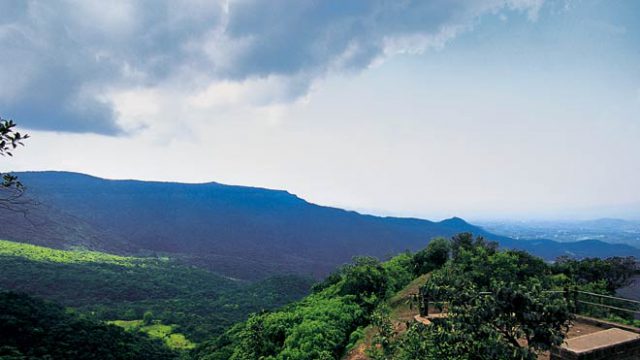It was raining by the bucketful and we could hardly see through the thick, white cloud that hung low over the hillside. Hills, people and cars appeared like silhouettes in the mist.
Down the slope rushed a number of springs, the water bursting into white spray when it hit the boulders below. The torrential rain notwithstanding, people scrambled up and down the slippery slopes, dashing in and out of the waterfalls. We even spotted a few women, with babies in their arms, joining in the fun. Die-hard selfie fans, their phones wrapped in thin cellophane, posed where the volume of the water was at its thickest.

On the other side of the road, men and monkeys sat on the low guard wall—the men were trying hard to protect their food and the monkeys were trying hard to snatch it. People of all ages ran about from one side of the road to the other, others disembarked from smaller vehicles at any odd corner and generally flouted all rules of the road in their eagerness to hit the falls. The madness at the Amboli Dhaba on the Amboli-Ghat Road had to be seen to be believed.
And through all this chaos, the Belgaum and Goa-bound buses trudged up the hillside, their horns blaring and headlights blazing, creeping along a narrow road that was further narrowed by parked vehicles and temporary kiosks selling tea, hot chana and corn.
Located a little over 500km from Mumbai, Amboli is a small town that lies quiet for the greater part of the year. Located at a height of 2,000 feet, it’s the last hill station in Maharashtra before the Western Ghats drop off to the coast of Goa. It’s only during peak monsoon that the place sees a rush of tourists who arrive to enjoy the hilly springs. Along with them come naturalists eager to catch a glimpse of the amphibians and reptiles that come out in droves in these hills. These include the Malabar gliding frog, the fungoid frog, the bicolour frog, the Amboli bush-frog, the Amboli toad, Beddome’s Cat Snake, Ceylon Cat Snake, Green Vine Snake, Malabar Pit Viper and various caecilians.

Before setting off on our wild quest among the hills led by a naturalist from the BNHS, we paid a visit to the Hiranyakeshwar Temple nestling within the verdant hills. Adjacent to the temple is a deep cavern from where emerges the Hiranyakeshi River. The trek uphill to Mahadevgad was strenuous but the panoramic view of the mist covered countryside was compensation enough. As far as our naturalist-aided trip to watch the fabled fauna of Amboli was concerned, alas, it was washed downhill by the rains.
The Information
Getting There
Sawantwadi on the Mumbai-Goa NH66 convenient gateway (it’s also a station on the Konkan Railway) to Amboli. During the monsoon, the Konkan Railway’s schedule can become irregular so take a Goa-bound bus to Sawantwadi. From here, you can hire an autorickshaw to Amboli, about 30km away.
Where To Stay
Limited accommodation available at Amboli. Two popular resorts are Nisarg Family Resort (nisargfamilyresort.com) and Whistling Woods (amboliww.com).




